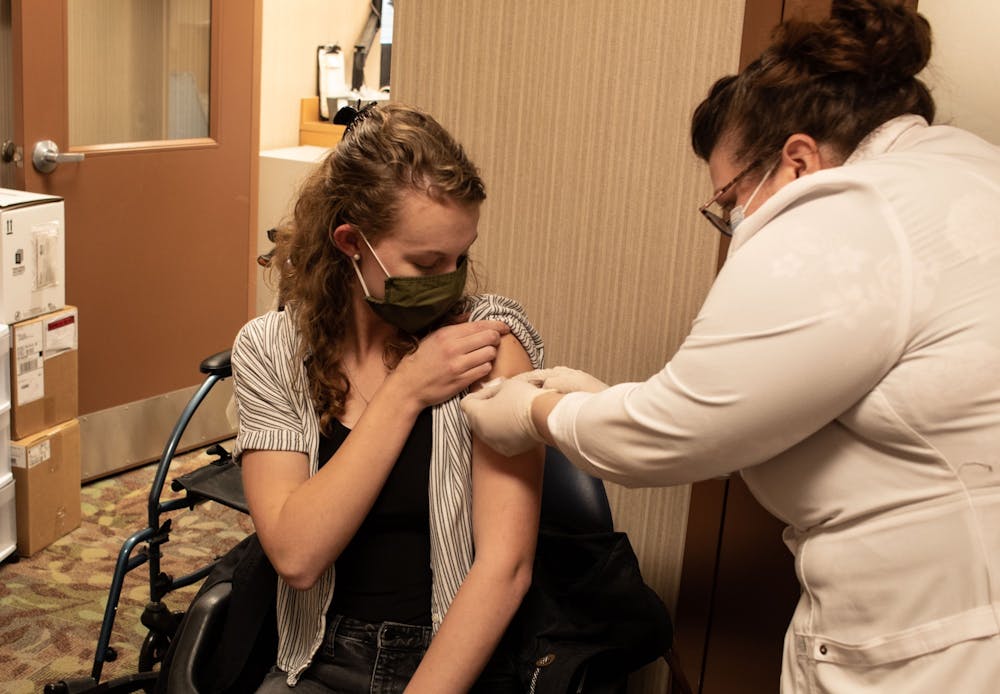As more Bloomington residents prepare for their COVID-19 vaccinations, it is important to know these tips before receiving the first vaccine dose.
To schedule a vaccine appointment, Hoosiers can go to ourshot.in.gov or call 2-1-1 between 8 a.m. and 8 p.m. There are also appointments available through many Kroger, CVS, Meijer, Walgreens and Walmart locations, separate from the State of Indiana’s process.
According to the CDC, getting the vaccine is a safe way to help prevent you from contracting the virus and build protection or immunity.
Receiving the vaccine
Any coronavirus vaccine you receive is free and paid for by the federal government, but clinics may ask for insurance information to then charge your health care provider a fee, according to the Washington Post.
But your vaccine will still be free even if you don’t have insurance.
Wear short sleeves to the vaccine clinic for your shot, and reschedule your vaccine appointment if you feel sick the day of rather than going to the appointment.
According to the CDC, if you have any questions regarding the vaccine because of allergies or underlying conditions, you should consult your doctor before getting the shot or registering for a specific vaccine. The CDC also recommends you do not take over-the-counter medicine like ibuprofen or aspirin before getting the vaccine to try to prevent side effects from the vaccine.
Dr. Gregory Zimet, a professor of pediatrics and clinical psychology for the IU School of Medicine, said students should still get the vaccine even though college students aren’t the most at-risk group if they contract COVID-19.
“It’s rare, but it’s awful when it happens.” Zimet said. “So why not get a safe vaccine that will prevent it?”
Data from ISDH shows that statewide deaths for 0-19 and 20-29 year-olds due to COVID-19 amounts to 0.3%.
He said if people want to get back to any kind of normal life, everyone that can should get vaccinated.
When showing up for your vaccine appointment, he said the expectation is that you will be wearing a mask that covers your nose and mouth.
He said to bring a valid ID to your vaccine appointment. The Washington Post said to also bring your health insurance information. Another recommendation includes printing out or saving a picture of your appointment confirmation for your vaccine, according to the Washington Post.
Zimet said after receiving the shot, you may feel side effects such as a sore arm or fatigue. This is normal, he said.
Zimet said it takes time before you become fully vaccinated. For the Pfizer or Moderna vaccine, you are considered fully protected two weeks after your second shot and two weeks after the one-shot Johnson & Johnson vaccine, according to the CDC.
Appointments in total are expected to take 30-45 minutes, according to the Washington Post, and recipients should show up on time.
After the vaccine
Zimet said clinical staff at the vaccine site may ask you to stay around 15 minutes after to monitor you for significant reactions to the vaccine. He said these reactions are rare.
If you have any history of allergic reactions to vaccines, you will be recommended to wait at least 30 minutes after getting your vaccination, according to the CDC.
Staff at the clinic will also give you a paper vaccination card after your visit that shows what vaccine you received and when, Zimet said. He said for those receiving the Pfizer or Moderna shot, the card will remind you to get your second shot of that specific vaccine.
Dr. Uchenna Ikediobi, an assistant professor of general internal medicine and infectious diseases at Yale University, told the New York Times you should take a picture of your vaccine card and keep the card in a safe place.



